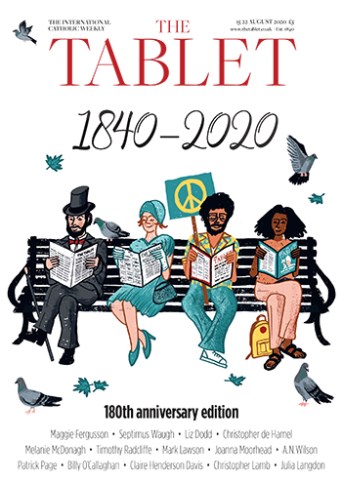180th anniversary edition
Last week we published our summer double issue, so no print edition this week: it’s given us a few days’ break. I hope you’ve been enjoying some of the articles celebrating the 180 years since we first appeared.
We wrote in our leader in this double issue that this has to be a time of metanoia, of moral and spiritual renewal. There can be no return to the world as it was before the arrival of the coronavirus. It’s a theme to which Pope Francis has returned several times. “Go down into the underground,” he said in his interview in our Easter issue – the week we entered into lockdown – “and pass from the hyper-virtual, fleshless world to the suffering flesh of the poor. This is the conversion we have to undergo. And if we don’t start there, there will be no conversion.” At his general audience yesterday, as Ruth Gledhill reports on our website, Pope Francis called for renewed action to combat the inequalities that have been exacerbated by the pandemic. “The plight of the poor and the great inequality that reigns in the world has been exposed,” he said. “On the one hand, it is imperative to find the cure for a small but terrible virus, which brings the whole world to its knees. On the other hand, we must cure a great virus, that of social injustice, inequality of opportunity, marginalisation and the lack of protection of the weakest.”
There might be no print edition landing on your doormat this week, but there is free-to-access news and comment as well as features and reviews on our website, which is updated several times a day. In recently-posted blogs, Helen Watt of the Anscombe Bioethics Centre writes that the fears of those who pointed out the dangers to women of home abortions during lockdown have been made chillingly clear by a leaked email from a senior regional midwife; and Andrew O’Neill, headteacher of All Saints Catholic College in London, is preparing for the start of the new school year, determined to reawaken his students’ sense of community and their value within it. Subscribers can also access the entire 180-year archive of The Tablet via our website: every issue is there, in both pdf format and as a digitised text. It’s an astonishing scholarly resource and a browser’s delight.
In the 180th anniversary issue, Christopher Lamb describes how well-funded Catholic lobby groups and media organisations who view Pope Francis with disapproval are trying to ensure that the next conclave elects someone more to their taste. A.N. Wilson and Mark Lawson portray the world into which The Tablet was born in 1840, a time of bitter divisions and of dawning religious doubt. Timothy Radcliffe is also celebrating a significant birthday – he will soon be 75 – and – like many of us at The Tablet – he finds himself wondering what comes next. And Julia Langdon discovers the woman novelist who served as our first Paris correspondent. Septimus Waugh, the youngest of Evelyn Waugh’s seven children, writes touchingly about a gentle, melancholic father; Maggie Fergusson investigates a recently discovered cache of George Mackay Brown’s notebooks that shows how deeply he empathised with the inner struggles of fellow poet and Catholic convert Gerard Manley Hopkins; Christopher de Hamel writes of his exhilaration when he realised that he had identified Thomas Becket’s cherished Psalter; Claire Henderson Davis describes a very personal path to prayer; and Billy O’Callaghan remembers the strange, wet summer when his neighbours flocked to see the moving statue of Our Lady in Ballinspittle, in what he now realises was Catholic Ireland’s final tremor.
Joanna Moorhead takes a quick scamper through our Arts pages over 180 years, and we have the first of a two-part selection of Summer Reading. On the Letters pages, Bruce Kent urges the bishops of England and Wales to join Pope Francis in condemning the possession of nuclear weapons, and correspondents express their disappointment that the Scottish bishops have decided to adopt the ESV translation of the Bible for reading at Mass: “it is neither accurate nor accessible”, Tom Stanford writes. Columnist Liz Dodd is also baffled by the decision to pick the stodgy, unreliable, exclusive-language ESV translation when there are more familiar, more scholarly and more elegant alternatives easily available; Melanie McDonagh considers those in the private sector whose jobs are threatened by redundancy; and N. O’Phile writes of the troubles in the Italian wine business. The natural treasure Jonathan Tulloch shares with us this week is hemp-agrimony, one of the UK’s tallest plants, with reddish stalks that can lift the pinky-white flowers to heights of two metres.
In Word from the Cloisters, we look briefly at the issues of The Tablet that marked our 50th, 100th and 150th anniversaries. Thirty years ago, John Harriott recalled how for his Lancashire family, “The Tablet was like a ghost in the machine of their Catholic life”. Each week, he wrote, “it has to stand apart from the crowd, not to rewrite or gloss over the unpalatable, but to see more deeply, to think more independently. It sheds light and truth or is not worth doing.”
Every week, there is something I miss, something I might not have found just the right word for. But we try to preserve independence of judgement amid the clamour, not assuming that the grain is always wrong but being willing to go against it; not fearing unpopularity, being prepared to take risks and to challenge powerful interests wherever they obstruct the common good. Now in our 181st year, we renew our commitment to serve the Church in its pursuit of truth and justice – even when our voice may not always be a welcome one.

Brendan Walsh
Editor of The Tablet
Get Instant Access
Subscribe today to take advantage of our introductory offers and enjoy 30 days' access for just £7.99
SUBSCRIBE NOW

